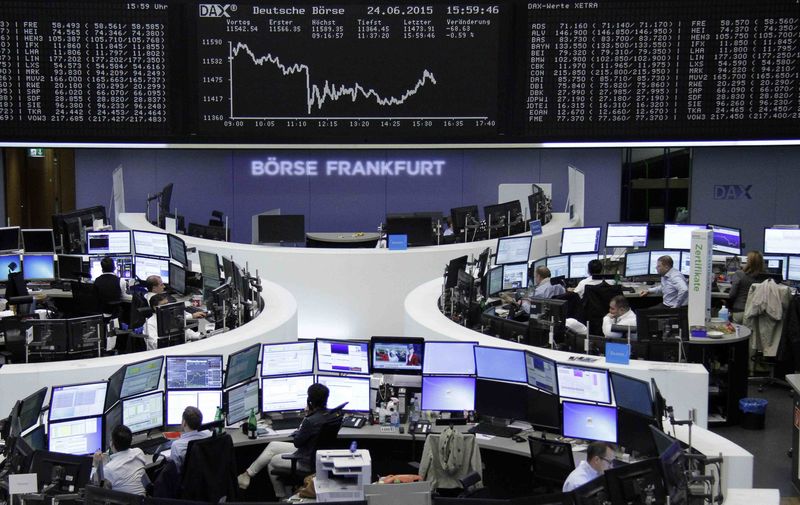By Marius Zaharia
LONDON (Reuters) - Persistent concerns of Greece leaving the euro weighed on European stocks on Thursday, with the lack of progress in negotiations on a cash-for-reform deal for Athens pushing investors towards safe-haven German Bunds.
The talks stumbled on Wednesday, with euro zone finance ministers accusing Greece of refusing to compromise ahead of a deadline next week when an International Monetary Fund loan tranche of 1.6 billion euros comes due.
Greek officials say without a deal the country does not have the money to pay the IMF. A default may trigger a bank run and may push the country out of the euro.
European Union leaders are set to meet again on Thursday.
The pan-European FTSEurofirst 300 index was down 0.5 percent at 1,569.82 points after closing 0.4 percent lower in the previous session. Yields on top-rated German 10-year Bunds, which set the standard for euro zone borrowing costs, fell 1 basis point to 0.83 percent.
"Today is another day that will be all about Greece," said Anders Svendsen, chief analyst at Nordea. "The Greek deadline is approaching with no agreement on the table, which is pushing investors towards safety."
Yields on Europe's lower-rated bonds in Spain, Italy and Portugal rose 2-3 basis points. The three countries are seen as the most vulnerable to contagion from Greece.
The Greek crisis had a global impact. MSCI's broadest index of Asia-Pacific shares outside Japan was down about 0.44 percent. Japan's Nikkei stock index ended down about 0.5 percent after hitting its highest level since 1996 on Wednesday on hopes for a Greek deal.
"Optimism around a Greek deal had been driving price action all week but a stall in the negotiation process has put the brakes on the rally," IG market strategist Stan Shamu wrote in a note.
Hennes & Mauritz fell 2.2 percent after the world's second-biggest fashion retailer reported a fiscal second-quarter pretax profit roughly in line with expectations and said a stronger dollar would result in gradually increased purchasing costs.
EURO HOLDING UP
The dollar index, which tracks the greenback against a basket of six major rivals, was slightly lower on the day at 95.192.
The euro was up slightly at $1.1215, showing less responsiveness to the Greek crisis than the bond and stock markets. Some strategists say the market has been using the euro as a funding currency for carry trades, in which investors borrow euros and sell them to buy higher-yielding currencies.
"What has been fairly clear is that every time there's a chance of a deal the euro plummets, and every time there's disappointment coming along, it reverses course," said Neil Mellor, FX strategist at Bank of New York Mellon (NYSE:BK) in London. "The only interpretation you can place on that is that the market is looking to use the euro as a funding currency in a carry trade ... The prerequisite of a carry trade is relative stability, so if a Greek deal is on, you sell the euro."
In commodities trading, U.S. crude was steady at $60.24 a barrel after plunging more than 1 percent on Wednesday on a government report showing that an eighth straight weekly drop in U.S. crude stockpiles was offset by a large build in refined products. Brent crude added about 0.1 percent to $63.61.

Spot gold edged up to $1,176.80 an ounce after sliding for the past four sessions to a two-week low.